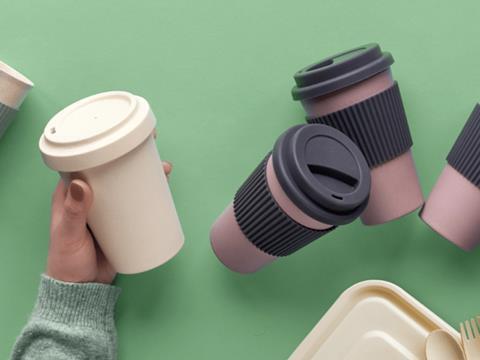
Hubbub has released a report outlining the impact and learnings from six reuse projects funded by its Bring It Back Fund; the insights have revealed five ‘key ingredients’ hoped to inform the creation of further reuse and return systems for food and beverages.
Run by Starbucks and Hubbub with proceeds from the UK’s 5p cup charge, the Bring It Back Fund saw Keep Scotland Beautiful, Reath Technology, Green Street, Again, Mercato Metropolitano, and PECT share the £1.4 million prize money between their respective reuse projects. These ranged from reuse tracking software to loyalty programmes and doorstep packaging collection.
An average return rate of 57% was achieved between the funded projects; in the best-performing locations, return rates were as high as 92%.
From these results, Hubbub suggests that all reuse systems should be as convenient as single-use alternatives. It argues that any friction points should be removed; for instance, companies should ‘carefully consider’ the use of apps, which can dissuade customers from engaging in a project. Instead, it urges companies to give participants plenty of opportunities to return their packaging.
Communications explaining how the system works and what its benefits are should be clear and concise, Hubbub continues. These instructions should be displayed on various channels, including social media, digital marketing, and outdoor advertisements.
The report continues that companies should never assume that the public understands why they should choose reuse over recycling. Reuse systems must forefront their environmental benefits to encourage consumers to take part.
It adds that, as well as keeping costs low and incentives or rewards for participation high, teams delivering the reuse scheme on the ground should offer strong buy-in, ensuring that they understand why reuse is preferable to single-use and can promote it to customers.
In Hubbub’s previous Reuse Systems Unpacked report, 67% of respondents expressed concern about the impact of single-use food and drink packaging on the environment. It stated that uptake in reusable packaging remains low – even for reusable coffee cups, which are often incentivized and discounted at coffee shops.
More recent polling conducted by Hubbub in 2023 saw 29% of participants claim that, at least once a week, they intend to use reusable packaging but don’t have it to hand. As such, Hubbub suggests that borrowing and reusing packaging in a reuse system overcomes the roadblock of having to remember, carry, and clean reusable containers.
Gavin Ellis, director and co-founder of Hubbub, said: “Single-use is deeply embedded in our society and will require radical thinking and bold new approaches to help people make the transition to a more circular economy with reuse at its core.
“It’s become very clear through these trials that to be truly effective, these schemes need to be everywhere; they need to be normalized and they need to be built into everyday habits and routines. A piecemeal approach doesn’t work.
“Convenience is crucial – single-use is so convenient that any alternative has to be as close to this as possible to get the uptake. It’s also vital that we help the public understand the benefits of reuse and returns and we shouldn’t assume the public knows why this is preferable over recycling single-use items.”
“We are incredibly excited to share the findings of our six Bring It Back Fund projects,” added Jacqui Wetherly, UK director of Sustainability at Starbucks. “Enabling and encouraging customers to reuse and return cups is a complex task, and robust research is invaluable as we seek to develop new ways to reduce waste.
“This fund has allowed us to test different processes, and environments, to understand not only what works best, but the key factors that all reuse systems should either feature or consider. We hope the findings will be useful as we all seek to reduce our single-use waste, and give our customers more options with every cup.”
The report comes after Planet Reuse and New ERA revealed their rEUse campaign last year. The solution sought to implement balanced reusable packaging systems across a range of sectors – including takeaway, beverage, and e-commerce – in line with the EU Commission’s mandatory reuse targets.
Hubbub and McDonald’s also launched their #InTheLoop grant fund in 2022; the money was intended to support two new projects in the introduction or improvement of recycling infrastructure in public spaces.
Regarding the Packaging and Packaging Waste Regulation’s stance on reuse, a position paper signed by Reloop, the Ellen MacArthur Foundation, Zero Waste Europe, and TOMRA called for a clearer definition of reusable packaging in the Packagng and Packaging Waste Regulation’s stance on reuse, as well as the implementation of complementary refillable solutions.
If you liked this article, you might also enjoy:
The Lidl approach to packaging sustainability
How did Brazil achieve its 100% aluminium can recycling rate – and can it be replicated in the EU?
Experts have their say on the EU’s Packaging and Packaging Waste Directive revisions
A deep dive into the most important packaging sustainability trends and solutions














No comments yet